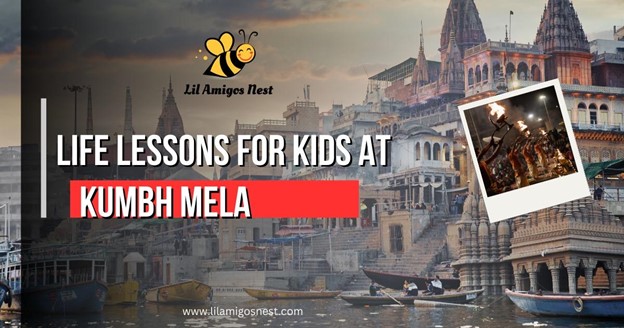Life Lessons for Kids at Kumbh Mela

The Kumbh Mela, also known as the Mahakumbh Mela, is not just a Hindu festival but a grand confluence of faith, culture, and spirituality. This unique event, which happens every 12 years, is the largest religious gathering on earth. As we gear up for the next Kumbh Mela in 2025, it’s a wonderful opportunity to teach children valuable life lessons. The festival’s scale, history, and cultural significance make it an ideal setting for kids to learn lessons that they might carry with them throughout their lives. Here are some key life lessons that kids can learn by attending the Kumbh Mela.
1. Unity in Diversity
The Kumbh Mela attracts millions of devotees from across India and the world, cutting across language, caste, and regional barriers. By observing this incredible amalgamation of people, children can understand the beauty of India’s diversity. They witness how individuals from different walks of life come together, united by faith and devotion.
This teaches kids that despite our differences, shared values and common goals can bring people together. It’s a powerful message of unity that aligns with the festival’s spirit of harmony and community.
2. Importance of Faith and Spirituality
The Kumbh Mela is deeply rooted in Hindu mythology and spirituality. It revolves around the belief in attaining moksha (liberation) by bathing in the sacred rivers during the auspicious times listed in the Kumbh Mela schedule. This offers kids a chance to understand the importance of faith and spirituality's role in people’s lives.
Parents can use this opportunity to introduce their children to stories from Hindu scriptures, such as the Samudra Manthan (churning of the ocean), which is closely linked to the origins of the Kumbh Mela. These stories can inspire kids to appreciate cultural traditions and values.
3. Patience and Tolerance
The Mahakumbh Mela is where millions gather in a relatively small area. Navigating the crowds, waiting in long queues, and participating in rituals require immense patience. For children, this is a practical lesson in tolerance and self-control.
By observing how others handle the challenges of such a massive gathering with composure, kids learn the value of staying calm and respecting others, even in difficult circumstances. It’s a skill they will find useful throughout their lives.
4. Environmental Awareness
The Kumbh Mela’s location, typically at the confluence of sacred rivers, underscores the importance of nature and the environment in Hindu culture. Kids can learn about the significance of rivers like the Ganga, Yamuna, and the mythical Saraswati, and why they are revered.
Parents can use the occasion to discuss the need for keeping these rivers clean, not just for religious reasons but also for ecological balance. Encouraging kids to participate in cleaning drives or water conservation activities at the Kumbh Mela can instill a sense of responsibility towards nature.
5. Cultural and Historical Knowledge
The next Kumbh Mela in 2025 will be a living classroom of Indian culture and history. Children can explore the historical significance of the festival, its origins, and how it has evolved over centuries. They can learn about the various rituals, sadhus (holy men), and akharas (religious organizations) that are an integral part of the event.
Exposing kids to the cultural richness of the Kumbh Mela fosters a deeper appreciation for their heritage and helps them understand the importance of preserving it.
6. Generosity and Compassion
The Kumbh Mela is marked by acts of charity and kindness. Devotees distribute free food, water, and other essentials to fellow pilgrims. These acts of selflessness offer a practical demonstration of compassion and generosity.
Parents can encourage kids to participate in these charitable activities, teaching them the joy of giving and the importance of helping those in need. Such experiences can shape them into empathetic individuals.
7. Resilience and Adaptability
Attending the Kumbh Mela requires adjusting to basic facilities and enduring various physical challenges. Whether it’s dealing with crowds, braving the weather, or navigating unfamiliar surroundings, kids learn to be resilient and adaptable.
Such experiences help them step out of their comfort zones and develop a sense of independence. They learn that life isn’t always easy, but challenges can be overcome with a positive attitude.
8. Teamwork and Cooperation
Attending the Kumbh Mela often involves working as a family or group to ensure everyone stays safe and enjoys the experience. From planning the trip to sharing responsibilities during the festival, kids learn the importance of teamwork.
These collaborative efforts teach children to value cooperation and effective communication, skills that are vital in both personal and professional life.
9. Understanding Sacrifice and Gratitude
The sadhus and ascetics who attend the Mahakumbh Mela live a life of renunciation and simplicity. Observing their way of life can help children understand the concept of sacrifice and the importance of gratitude.
Kids can learn to appreciate the comforts they enjoy in their daily lives and develop a sense of thankfulness for what they have.
10. Health and Wellness
The Kumbh Mela also emphasizes the importance of physical and mental well-being. Yoga sessions, meditation camps, and Ayurvedic remedies are a significant part of the festival. Introducing kids to these practices can encourage them to adopt a healthy lifestyle from an early age.
Parents can use this opportunity to teach their children simple yoga asanas or mindfulness techniques that they can practice regularly.
11. Value of Tradition and Rituals
Participating in rituals like the sacred bath, chanting prayers, or lighting diyas can instill a sense of respect for traditions in children. It’s an opportunity for parents to explain the significance of these rituals and their deeper meanings.
This helps kids understand that traditions are not just about following rules but are a way to connect with their roots and values.
12. Global Citizenship
The Kumbh Mela attracts visitors from all over the world, making it a global event. For kids, interacting with people from different cultures and backgrounds broadens their horizons and fosters a sense of global citizenship.
It’s an invaluable lesson in understanding and respecting cultural differences while finding common ground.
13. Planning and Organization
Attending an event as grand as the Kumbh Mela requires meticulous planning. From scheduling the trip according to the Kumbh Mela schedule to packing essentials and navigating the site, kids can learn the importance of being organized.
Parents can involve children in the planning process, teaching them how to prioritize tasks and manage time effectively.
Conclusion
The Kumbh Mela is much more than a Hindu festival. It’s a rich tapestry of spirituality, culture, and life lessons. The next Kumbh Mela in 2025 offers a unique opportunity for kids to learn valuable lessons that books and classrooms cannot teach. From unity and compassion to resilience and environmental awareness, the Mahakumbh Mela is a transformative experience that can shape young minds.
As families plan their visit to the Kumbh Mela, it’s essential to prepare children for this incredible journey. By encouraging them to observe, participate, and reflect, parents can ensure that their kids gain meaningful insights from this unparalleled event. Let the Kumbh Mela 2025 be an enriching experience for the entire family, leaving behind lessons that resonate for a lifetime.


























